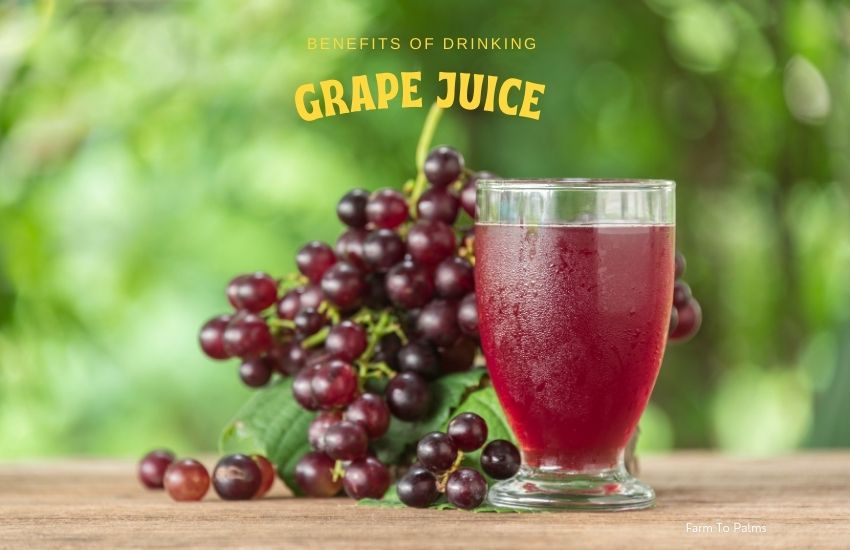If you’re wondering if grape juice is good for you, you’re not alone. As more people focus on their health and nutrition, finding the right balance between tasty and healthy is crucial. Today, we’re diving into grape juice and its potential impact on your health. It tastes great and is packed with vitamin C, antioxidants, and polyphenols—compounds that can benefit your heart, immune system, and more.
In this article, we’ll break down the nutritional facts of grape juice, its health benefits, and how to incorporate it into a balanced diet. I’m Farm To Palms, and here at farmtopalms.com, my mission is to help you make informed decisions about what you put in your body. Let’s see if grape juice is a healthy choice for you!
Rich in Antioxidants: How Grape Juice Fights Oxidative Stress
One of the most remarkable qualities of grape juice is its high antioxidant content. Antioxidants like flavonoids, polyphenols, and resveratrol protect your body by fighting oxidative stress, which can lead to inflammation and damage to your cells. These antioxidants are mainly concentrated in purple grape juice made from Concord grapes. If you’re looking for a simple way to incorporate antioxidants into your daily routine, grape juice might be the perfect option.

Resveratrol, in particular, is a compound that has gained attention for its potential to improve heart health by reducing cholesterol levels and improving blood circulation. Research shows that antioxidants found in grape juice can also play a role in lowering the risk of certain chronic conditions, including heart disease and cancer. This makes grape juice an easy and enjoyable way to boost your body’s defenses against harmful free radicals.
Boosts Heart Health: Grape Juice and Cardiovascular Wellness
Drinking grape juice could be bright if you’re looking for a way to support your cardiovascular health. Studies have shown that the polyphenols and resveratrol found in grape juice help improve blood flow and reduce cholesterol levels. This can significantly lower your risk of heart disease, especially when combined with a heart-healthy diet.
For instance, unsweetened grape juice contains 0.3 grams of fat per serving, making it a low-fat option that won’t add unnecessary cholesterol to your diet. Moreover, these heart health benefits are especially noticeable with purple grape juice, which has higher concentrations of resveratrol. Research suggests daily grape juice consumption may help reduce inflammation and prevent artery blockages—critical factors in maintaining a healthy heart.
Supports Immune Function: The Power of Vitamin C in Grape Juice
Let’s not forget about one of the most essential nutrients in grape juice: vitamin C. One cup of unsweetened purple grape juice delivers a whopping 70% of your recommended vitamin C intake. This vitamin is essential for supporting your immune system, especially during cold and flu season.

Regularly drinking grape juice will give your immune system the boost it needs to fight off infections. Plus, vitamin C plays a role in skin health, helping to keep your skin looking youthful by supporting collagen production. Grape juice is an excellent addition to your diet if you value a solid immune system and healthy skin.
Digestive Health: Does Grape Juice Aid in Digestion?
Regarding digestive health, grape juice can provide a mild benefit. While grape juice isn’t as rich in fiber as whole grapes, it still contains small amounts of fiber (0.5 grams per cup) that can contribute to digestive regularity. More importantly, polyphenols found in grape juice have been shown to support a healthy gut microbiome—the collection of good bacteria that aids digestion and overall health.
Drinking grape juice could also help prevent constipation by promoting smoother bowel movements. However, eating whole grapes might be a better choice for those who need more fiber. Whole grapes contain more fiber, which is essential for long-term digestive health.
The Truth About Sugar Content: Is Grape Juice Suitable for Blood Sugar Control?
Many people worry about the sugar content in fruit juices; grape juice is no exception. Unsweetened grape juice contains 36 grams of natural sugar per cup, which can raise concerns about blood sugar levels. However, this doesn’t mean you have to eliminate grape juice from your diet entirely—moderation is vital.

Compared to sugary sodas or artificial juices, 100% unsweetened grape juice is healthier because it contains no added sugars. For those managing their blood sugar levels or concerned about type 2 diabetes, it’s vital to pair grape juice with fiber-rich foods or dilute it with water. Doing so can help balance the sugar absorption and minimize spikes in blood sugar.
Weight Management: Can Grape Juice Help or Hinder Your Goals?
Regarding weight management, grape juice can be a double-edged sword. On the one hand, its natural sugars provide a quick energy boost, which can be helpful before or after a workout. On the other hand, grape juice is relatively high in calories, with 152 calories per cup. If consumed in large amounts, those extra calories could lead to weight gain, especially if not balanced with other nutrients.
To avoid these potential downsides, I recommend limiting your intake to a moderate amount—about 4 to 10 ounces daily. This allows you to enjoy grape juice’s hydrating and nutrient-rich benefits without consuming too many calories.
Best Practices: How Much Grape Juice Should You Drink?
So, how much grape juice is ideal? According to health experts, consuming 3.4 to 5 ounces of grape juice daily is best to enjoy its health benefits without overloading on sugar and calories. Stick to unsweetened varieties made from 100% grape juice, and avoid juices that contain high fructose corn syrup or added sugars.
If you’re looking for a healthy way to add grape juice to your diet, try using it as a base for smoothies or mixing it with sparkling water for a refreshing drink. This will give you the antioxidant boost you need while keeping your sugar intake in check.
Whole Grapes vs. Grape Juice: Which Is Healthier?
When deciding between whole grapes and grape juice, it’s essential to consider the differences in fiber and sugar absorption. Whole grapes provide significantly more fiber, which helps slow down sugar absorption and promotes digestive health. For example, a cup of entire grapes contains about 1.4 grams of fiber, compared to 0.5 grams of grape juice.

Whole grapes might be the better option if you’re watching your weight or concerned about blood sugar. But if you’re short on time and need a quick dose of vitamins and antioxidants, grape juice is still a solid choice.
Final Thoughts: Is Grape Juice a Healthy Choice for You?
In summary, grape juice is packed with antioxidants, vitamin C, and heart-healthy compounds like resveratrol, making it a beneficial addition to your diet. However, like any fruit juice, it’s important to enjoy it in moderation to avoid consuming too much sugar and calories.
For more insights into healthy eating and nutrition tips, check out other articles on farmtopalms.com. I’d love to hear your thoughts—comment below or share this post with someone who might find it helpful!

